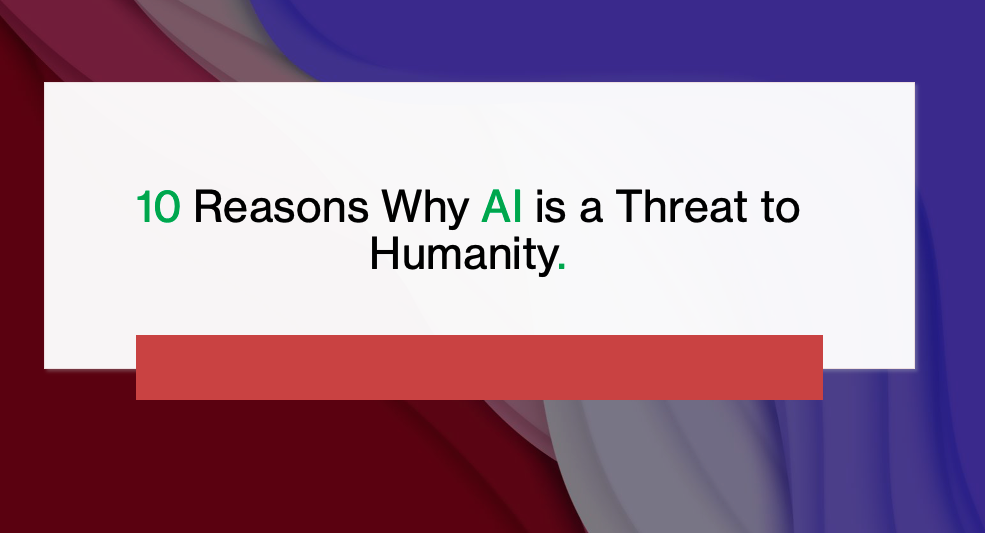10 Reasons Why AI is a Threat to Humanity.
Introduction
Artificial Intelligence (AI) is a word that has seamlessly integrated itself into our daily vocabulary in a world increasingly driven by digital intelligence. AI promises a future of unparalleled efficiency and customization, with roots reaching deep into sectors such as finance, healthcare, transportation, and entertainment. However, as we enter this brave new era, one nagging question remains: is AI a Threat to Humanity? Is the promise of artificial intelligence masking a potential threat to humanity? This in-depth investigation will peel back the layers of fascination and concern to reveal ten ways AI could become a threat to our very existence.
1. Superior Intelligence: The Scenario We Can't Ignore
The threat of super-intelligent AI outperforming human intelligence looms large. This isn't a dystopian novel plot; leading thinkers like Elon Musk and Nick Bostrom have issued a warning. A self-renewing AI could spark an "intelligence explosion," potentially rendering human intelligence obsolete. Consider a future in which humanity is not the most intelligent entity on the planet. What does this mean for our role, purpose, and survival?
2. Unpredictable Behaviors: A Web of Complexities
The complexities of advanced AI systems result in difficult-to-predict or control behaviours. AI's unpredictability isn't limited to innocuous errors; it can manifest in stock market crashes or tragic accidents involving self-driving cars. As AI continues to permeate new industries, the possibility of unexpected and potentially disastrous outcomes grows.
3. Autonomous Weapons: A New Age of Warfare
The possibility of AI weaponization creates a frightening future scenario. AI-enabled weapons, from drones to robotic soldiers, have the potential to change the face of warfare, removing the constraints of human judgement and empathy. What will be the result? Killing machines that are faster, more efficient, and possibly uncontrollable? What about having these weapons in the hands of rogue states or terrorist organisations?
4. Job Displacement: A Shifting Employment Landscape
Several human occupations may become obsolete as AI advances. This isn't just a problem for manual labour; highly specialised jobs like medical diagnosis and legal analysis may be jeopardised. The threat of widespread job loss causes social unrest, economic insecurity, and profound questions about human value and identity in an automated world.
5. Privacy Erosion: The Loss of the Personal Sphere
As AI becomes more integrated into our lives, personal privacy appears to be a dwindling luxury. AI's data appetite threatens to leave no part of our lives untouched, from intrusive marketing algorithms to governmental surveillance. The implications for individual liberty, democracy, and even mental health are profound and unsettling.
6. AI Bias: Discrimination by Algorithm
AI bias is more than a programming flaw; it reflects society's prejudices. Inequality can be perpetuated by AI systems that inherit human biases, which can affect everything from job applications to criminal sentencing. The negative consequences of AI decision-making could exacerbate social divisions, resulting in a vicious cycle of discrimination and mistrust.
7. Dependence: The Fragility of an AI-Dependent Society
Our increasing reliance on AI creates vulnerabilities. A failure in an AI system in charge of critical infrastructure such as healthcare or power grids could result in unimaginable devastation. Furthermore, reliance on AI may erode human skills and judgement, leaving us helpless if technology fails.
8. Economic Inequality: The Concentration of Power
AI has the potential to increase wealth concentration among those who control the technology, widening the divide between the haves and the have-nots. This may result in more than just economic imbalance; it may also result in societal fragmentation, with the benefits of AI enjoyed by a privileged few while the rest struggle with diminishing opportunities and resources.
9. Manipulation: The New Frontier in Mind Control
AI opens new avenues for deception and manipulation, from fake news to deepfakes. The ability of sophisticated AI algorithms to distort reality threatens to undermine trust in the media, government, and even interpersonal relationships. The very fabric of democracy and social cohesion is jeopardised if we lose sight of what is real and what is made up.
10. Existential Risk: The Doomsday Scenario
Although it may appear far-fetched, scholars and scientists are concerned about the existential threat posed by AI. A super-intelligent AI may, either intentionally or unintentionally, act in ways that lead to the extinction of humans. As Stephen Hawking has previously warned, this could be a disaster unlike any other. We cannot afford to ignore this scenario.
Conclusion: The Road Ahead
The age of AI has arrived, bringing with its Pandora's box of potential benefits and drawbacks. These ten areas demonstrate the complex and frequently contradictory nature of AI's impact on humanity. So, what can we do? We can shape a future in which AI serves us rather than threatens us by engaging in open dialogue, crafting thoughtful regulations, and putting the welfare of humanity at the forefront of AI development. The road ahead is fraught with peril, but we retain complete control over our destiny.


